A Time for New Dreams Read online
Page 2
5
A nation’s failure to honour its significant writers is a sign of imaginative impotence. Not to celebrate such greatness as it has annoys the gods for signal disregard of the gift of the spirit. To fail to appreciate the master-dreamers of our times is a sign that we cannot see what is good for us, or what is good in us.
It means that we do not recognise our own harvest, our own wonderful flowers, fruits, and trees. It means that we are not alive to our own good fortune, which we may as well not have. It is like living in poverty when gold and diamonds lie unrecognised among the weeds in our garden.
6
I have seen this principle at work on many continents. In Africa, during the first spring of freedom, its truth-loving writers sang, but not every nation listened, and decline and civil wars followed. Hopefully they will listen now.
Nations that imprison, torture, assassinate, or drive their writers into exile fall into the deadlands of their own darkness. No one loves such nations. Such nations do not love themselves.
7
Celebrate, or be dull. Appreciate, or be impoverished. Enhance, or give up the adventure of civilisation. Do not kill the romance of life. Most people want to live in brightened times. Most want to live in an air of enchantment, of creative challenge, of rich possibilities. Every child that becomes an adult wants to live in a world that breathes courage, imagination, and beautiful dreams. We all want the magic of that mythic sword that can conquer the darkness. There is no greater gift a people can be given than that they live a life touched with fable.
We ought to step out of our old, hard casing. We think we are one kind of people, when in fact we are always creating ourselves. We are not fixed. We are constantly becoming, constantly coming into being. Writers hold out the mirror to the bright visions of what we can be.
8
Honour that which should be honoured, or the spirit of the nation will quietly perish; and the nation will be the last to know this, for it will have forgotten how to dream.
Seeing and Being
Aphorisms
1
To see something one must first be something. One must become oneself.
2
To see what is going on in the art of the great writers or painters one must first of all be established in the art of oneself.
3
If one has not yet become oneself one cannot see the true self in others.
4
To see, one must first be.
5
All seeing depends first of all on being.
6
All the looking into the works of masters that we do before we have become ourselves is not true seeing, or it is missed seeing.
7
To see the true art or the truth in a work requires a solid foundation in oneself.
8
There must be a fully formed self for a fully formed seeing.
9
Otherwise like light passing through a transparent object the work of art passes straight through an unformed mind and heart.
10
It takes a work of art to see a work of art.
Plato’s Dream
The universities of the future will do one thing we do not do today. They will teach the art of self-discovery. There is nothing more fundamental in education.
We turn out students from our universities who know how to give answers, but not how to ask the essential questions. They leave universities with skills for the workplace, but with little knowledge of the best way to live, or what living is for.
They are not taught how to see. They are not taught how to listen. They are not taught how to connect with the wisdom in the world. They are not taught the art of obedience conjoined with intelligence, and how it precedes self-mastery.
They are not taught the art of reading. True reading is not just passing our eyes over words on a page, or even understanding what is being read. True reading is a creative act. It means seeing first; and then a subsequent act of the imagination. Higher reading ought to be a subject in the universities of the future. As we read, so we are.
On the whole, people do not actually read what is in front of them. They read what is only already inside them. I suspect this is true of listening; and that it is happening now, even as I speak to you, or as you read this page.
All our creativity, our innovations, our discoveries come from being able first to see what is there, and not there; to hear what is said, and not said. Above all to think clearly; to be nourished by silence. And beyond that – the art of intuition.
The universities of the future will have to engage the sublime value of intuition in our lives and work. How to make those intuitive leaps that can transform humanity, how to make this mysterious faculty available to all – this will be the true turning point in the future history of civilisation.
Discipline, hard work, rationality, calculation can get us only so far, and have become the norm. With these alone we produce efficient but mediocre citizens. But the art of intuition, the mysterious spark that separates the truly great artists and scientists and philosophers from the ordinary, this will one day have to be studied and developed in every human being for the highest benefits of the human race.
We need to teach students the inevitable necessity of self-discovery. Higher consciousness studies ought to be a fundamental part of education. All students ought to be philosophers. All students ought to be aware that they are the true spark for the transformation of the world. All students ought to be practical dreamers.
Universities ought not only to turn out students for the various spheres of business, science, the arts, and the general running of the society. They also need to awaken students into becoming people who enrich the life of the planet.
We are more than the jobs that we do. We are the co-makers of this world we live in. The moral force of citizens is too little used in the greater transformation of our world. We take the living potential that are young minds and turn them, reduce them, only into job-fillers and economy providers. We have regressed from Plato’s dream – the wonderful project of his academy.
Every student is a light, a creative spark, waiting to be of use in dispelling the darkness. The terms in which I speak might seem alien, but will become inevitable.
Every day the crisis of purpose grows larger in the lives of people; and prosperity or poverty does not diminish the paralysis it will bring if not addressed. A lack of understanding why it exists, or of its larger purpose in the scheme of things, is how society quietly perishes.
The universe grows more mysterious around us even as we find out more about it. The true reason is this: we are more than we suspect, but we are taught to see less in ourselves, to ask no questions about our true inner nature. And so the great mystery within peers into the greater mystery without. A mystery stares into a mystery: this is a hopeless position.
We ought now to conjoin faith in evidence with a need for self-discovery. Knowledge of self ought to be the great project of our lives. Knowing ourselves we will know others. Only by knowing ourselves can we begin to undo the madness we unleash on the world in our wars, our destruction of the environment, our divisions, our desire to dominate others, the poverty we create and exploit. Only through self-knowledge can we reverse the damage we do with all the worldly knowledge we have, which has been only a higher ignorance.
The true purpose of the university ought to be to unleash the sublime possibilities of the human spirit. Education is still in its infancy. The true education looms over the horizon, where our disasters are being born. There we will learn to avert what evils we ourselves have created. Then we will start again the great project of humanity, with humility and a new light.
On Childhood (2)
1
Childhood ought to terrify us with gentle wonder. It ought to make us feel curiously humble. It has in it something akin to genius: there is simply no accounting for its everlasting appeal, its unfathomability.
I am speaking here o
f an aspect of childhood that lingers in the depths of the mind, like an imperishable melody. I am not speaking here of the other aspects of spoilt or conditioned or wretched childhoods that can be seen in nasty little boys or horrid little girls. I speak of the childhood seen out of the corner of the eye. I speak of the conjunction of its uncoordination and its magic, its serenity and its confusions. I speak of its multiple perspective. Its freedom, its lack of freedom.
2
That is why childhood also has something sad about it. For childhood is the place where tyranny rules absolutely, and of necessity. The child is moulded. That is the beginning of its fall, the loss of its Eden. To the child the world is named, explained, mis-explained, seamed with errors, made smaller, made plainer, made too complicated, narrowed, filled with suspicion, dogma, superstition and envy. Wonder is driven out from the world. Mystery is chased away from the fabric of reality. The tendency to ask questions is turned into a tendency to assume. The inclination to trust is warped into an inclination to fear. Flexibility is misrepresented as weakness. Sensitivity is distorted into timidity. The child is shaped; or should one say misshaped. Its open nature is closed off; its river canalised; its mind trapped; its spirit caged; its playfulness made forced; its joys made suspect; its laughter imprisoned.
3
The child should be shaped open, should be taught to value all peoples, to respect all races and creeds. But the child is taught to be suspicious of difference. A flower is thus changed into a thorn, a river into a brook, a garden into a wasteland.
The child is enveloped in the forms of a particular culture, when it could also be opened out to be at home in the world, with all its diversity. For when the child is born, it is born not into the ghetto, the palace, the villa but into the world, the open world. The child is born into the world of men and women, history and dreams, the limited and the limitless, the backyard and the sky. The child is born into an inheritance of all books, all thoughts, all the music and art and science that have been created in the perpetual pilgrimage of humanity along the dusty roads of time.
4
Childhood is the only time when the mind is so free, when fairies are as real as fires, when fables are true and reality is constantly invented. The world is a dream. And then the snake creeps in. Slowly corruption creeps in too, and the dream dies.
Hemingway writes somewhere of rich men and women in their yachts who weep at night because they can’t sleep as purely as they did when they were children. More controversially, Blake writes that education is a sin. ‘Improvement makes strait roads; but the crooked roads without improvement are roads of genius.’
5
Some people loathe their childhood because they were betrayed by it. I know of childhoods so severe, brutalised, and poverty-stricken that it’s a wonder the children didn’t become mass murderers. They turned out relatively sane. This is a continuing marvel. Even in the hardest of people there lurks something of childhood’s elusive twilight. It may be distorted, but it is there. It comes out in what these hard people love, what they are sentimental about, or even, paradoxically, in what they hate.
The Romance of Difficult Times
1
All things in life are governed by the law of cycles.
2
There can be no rise without a fall, no fall without a rise.
3
There can be no prosperity without adversity that has been wisely transformed.
4
A glance at the history of civilisations reveals their humble and difficult beginnings. Think of the fall of Troy and what Virgil created out of that disaster: the wanderings and adversity of the people who became the future Roman Empire.
5
The Aeneid reminds us that great civilisations can be built on great failures. It also reminds us that adversity is not the end of a story but, where there is courage and vision, the beginning of a new one, a greater one than before.
6
Difficult times do one of two things to us: they either break us or they force us to go back to the primal ground of our being.
7
Adversity wakes us up. It reminds us not of who we think we are in our vanity, but who we really are in our simplicity.
8
Success makes us fly with unreal wings and more often than not, like Icarus, takes us too close to the sun.
9
But adversity reminds us that the earth is that on which we stand. We feel our feet on this earth. We learn to walk again with our feet on good solid ground.
10
There are few blessings more solid than being made to take the measure of ourselves.
11
Too often we go through life with vague dreams, wild goals or no goals at all.
12
When we are successful we believe in the rightness of our whims and thought. We believe the most inflated things about ourselves. We mythologise our abilities. We think of ourselves, secretly, as gods. This can only last so long either in the life of nations or individuals. And this is disastrous for true growth. It prepares a fall sooner or later.
13
Adversity tells us the truth of how things stand. It never deceives, never inflates, never lies.
14
Success can send us flying off in wrong directions for a long time. One need think only of the bloated complacency of the Persian Empire before its catastrophic encounter with the lean disciplined force of Alexander the Great.
15
The highest point of a great civilisation is not necessarily its golden age: that is merely the fructification. The highest point is actually in its earlier stages, after a people have worked their way out of a long adversity, having disciplined themselves, and faced their truths, and conceived worthwhile and magnificent goals, and moved steadily towards them with faith and a rapture of overcoming.
Alexander after the conquest of Darius; England in the Elizabethan age: this is where a people most becomes itself.
16
In the midst of adversity, face what needs to be faced.
17
‘Sometimes the way up is the way down,’ Heraclitus said.
18
For there to be a new prosperity we must first have a new adversity.
19
It is in difficult times that the great times ahead are dreamt and built, brick by brick, with maturity and the hope that comes from wise action.
20
Difficult times, in retrospect, are more romantic than good times, if they are overcome. Myths and fables are made of them.
Photography and Immortality
For Sandy Nairne
Photography ought to be seen as a species of magic, but we have lost our innocence. And so we see it as an aspect of reality.
There is no art by which to reproduce the lineaments of the real. Each human face will always be unique in skin, flesh, and features. Any attempt at exact reproduction loses the contours, the three-dimensionality, and the living quality of the individual face. What photography achieves in portraiture is not a reproduction but a refiguration, a translation from one dimension to another.
Something strange happens in this process: the human face is alienated. It is a metamorphosis in reverse. The face is thus simplified. The curved quality of space is flattened. Light is reduced in source and effect.
Portraiture is the dialogue of light and the face, in the dimension of memory. That is why the portrait is not the person. It is an abstracted memory, enriched by time.
Three principles make portraiture unique: light, the subject, and time. Of these three, the most alchemical is time. Time is the magic mercury, the fifth element, the quintessence. It is the constantly transforming and preserving substance of portraiture.
Time acts with the shutter speed. It acts with the speed of light that travels to the subject, from the subject to the camera, and from the photograph to our eyes.
There is an internal time that is also at work from the first mental encounter with t
he image to its interactions in the vast realm of memory. A realm perpetually impinged on by desire, loss, and life’s infinitely shaded experiences.
Time weaves a spell round the image – preserves it, changes it. Portraiture keeps the subject in its time and yet projects it into ours.
Portraiture is always time travel. It is a time travel that keeps all the secrets of its time concealed behind the subject. It freights over to us only the image, mute with all the passions of life.
Silent stories stare out from those eyes. They will no longer look upon the light or dark of our day. And yet they look at us as through a transparent medium, beyond even death. What is the true nature of that almost mystic medium?

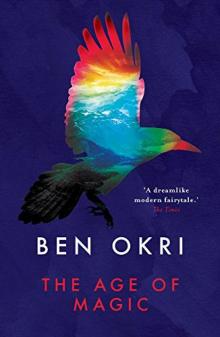 The Age of Magic
The Age of Magic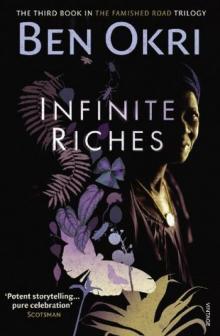 Infinite Riches
Infinite Riches Songs of Enchantment
Songs of Enchantment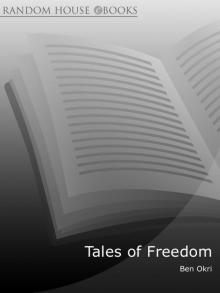 Tales of Freedom
Tales of Freedom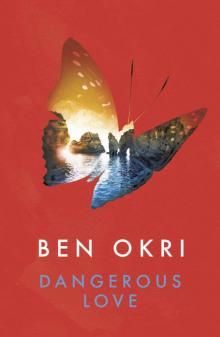 Dangerous Love
Dangerous Love Starbook
Starbook The Famished Road
The Famished Road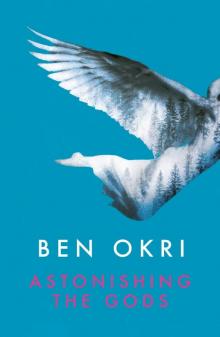 Astonishing the Gods
Astonishing the Gods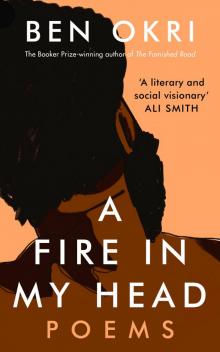 A Fire in My Head
A Fire in My Head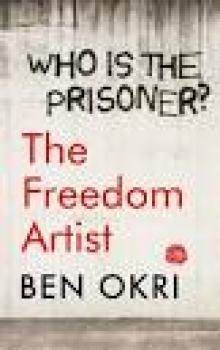 The Freedom Artist
The Freedom Artist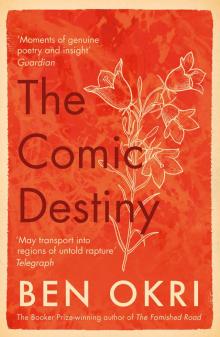 The Comic Destiny
The Comic Destiny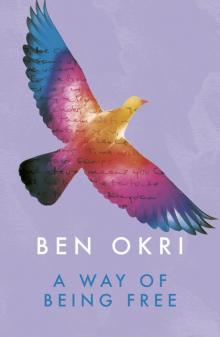 A Way of Being Free
A Way of Being Free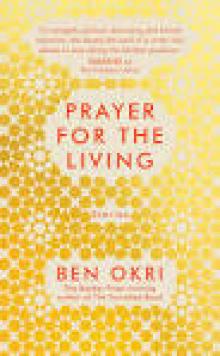 Prayer for the Living
Prayer for the Living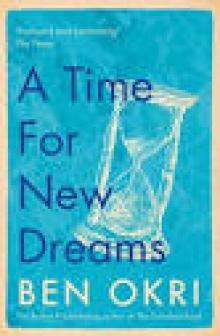 A Time for New Dreams
A Time for New Dreams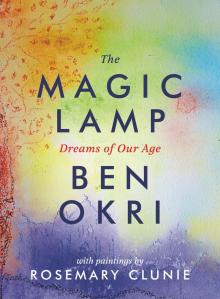 The Magic Lamp
The Magic Lamp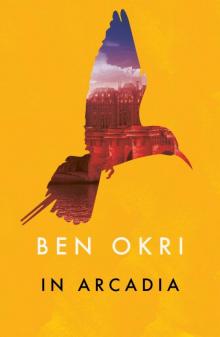 In Arcadia
In Arcadia